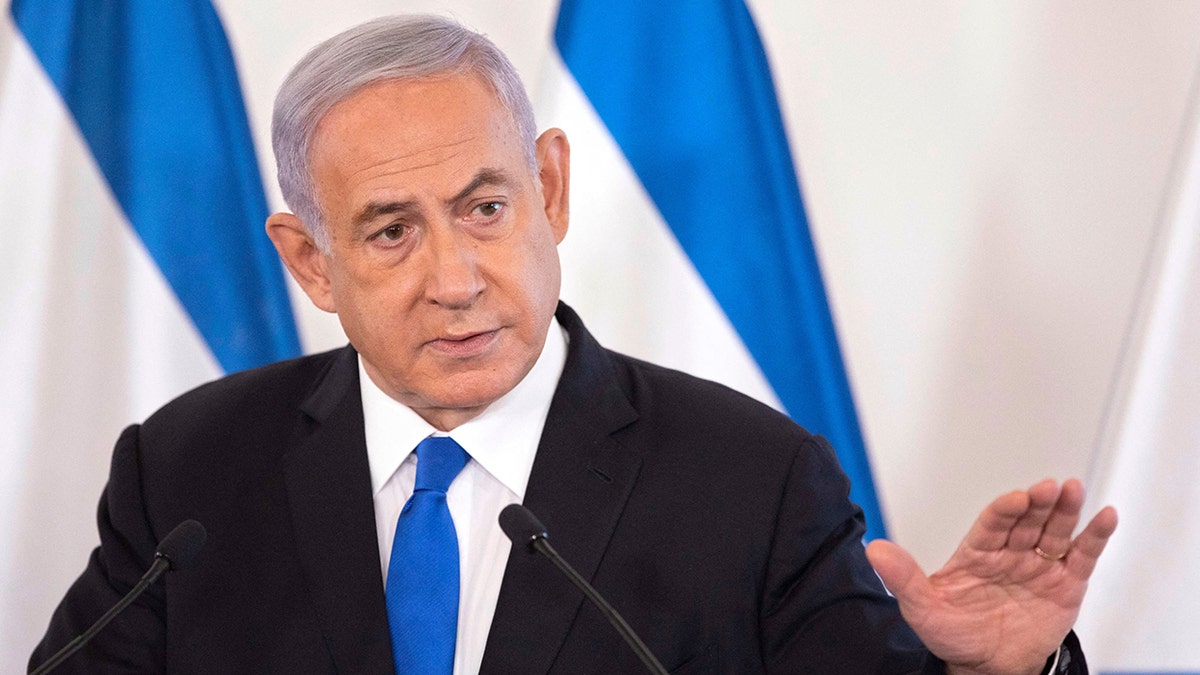Trey Yingst takes cover from Hamas rocket attack
FOX News' Trey Yingst takes cover while providing the latest coverage from the war in Israel
Editor's note: The following column was first published in City Journal.
Israelis are calling it "our 9/11."
The parallels are all too chilling, as Americans, especially New Yorkers, know well. But the devastation for Israel is proportionately even higher than it was for Americans. Adjusted for population, 700 murdered Israelis-the current estimate-would be the equivalent of 21,000 dead Americans. And now the Israeli-Hamas conflict risks widening.
Two days after some 1,000 Hamas militants struck Israel in 22 locations in the deadliest surprise attack since the Yom Kippur War of 1973, Israeli forces are still struggling to reclaim Israeli enclaves, secure their border, root out some 200-300 militant infiltrators, end the rocket attacks, and stop the slaughter.
ISRAEL AT WAR WITH HAMAS AFTER SURPRISE ATTACKS, AROUND 900 ISRAELIS DEAD
On Sunday, horror unfolded by the hour, with Israel’s death toll climbing to over 700, some 2,400 wounded, and estimates of those abducted rising to more than 130, including children and the disabled.

FILE Israeli Prime Minister Benjamin Netanyahu gestures as he shows a slideshow during a briefing to ambassadors to Israel at the Hakirya military base in Tel Aviv, Israel on May 19, 2021. (SEBASTIAN SCHEINER/POOL/AFP via Getty Images)
The largest killing field yet identified is a music festival, where approximately 260 young Israeli revelers were slaughtered. The United States State Department announced hours ago that at least nine Americans have been killed. Almost equally as shocking, much of the footage of Israeli hostages being led across the desert to Gaza and Israeli security facilities being attacked have come from Hamas, not from the Israeli government, which normally takes pride in its ability to shape a narrative.
Israel seems very much on the military and political defensive. Even as the conflict rages, questions and recriminations have begun pouring in from the families of those killed, wounded, or abducted, and from the millions of Israelis whose lives have been disrupted and confidence in their government shattered by Hamas’s sneak attack.
"Days after Israeli civilians near the border have been killed or abducted, families have yet to receive a call or a visit from an Israeli representative," said Smadar Perry, the veteran Arab affairs correspondent from Yediot Aharonot, Israeli’s largest daily newspaper. "This is unprecedented."
Much of the criticism is now aimed at Prime Minister Benjamin Netanyahu, whom Haaretz, one of Israeli’s leading liberal newspapers, called "entirely responsible" for the failures.
BLINKEN DELETES SOCIAL MEDIA POST CALLING FOR ISRAEL-HAMAS 'CEASE-FIRE'
Criticism of his leadership will undoubtedly grow as the shock of the enormity of Israel’s intelligence and security failures wears off. Criticism could also be fueled by early reports that Egypt’s chief of intelligence, Abbas Kamel, warned Netanyahu ten days ago, as Perry reported, that something "big" and "worrisome" was taking place in Gaza and that he ought to consider moving Israeli forces from northern Israel and the West Bank, where settlers and Palestinians have increasingly clashed, to the Gaza border.
For the moment, however, many Israelis are depending on Netanyahu to rally the Israeli Defense Forces, protect their security, and punish Hamas for the targeting of civilians and other war crimes. As Hamas rockets struck Israel early Saturday morning, Netanyahu immediately declared that Israel was at war, vowing that the enemy would "pay a price he has never known." He also ordered Gazans to leave places inhabited by Hamas. Where they are supposed to go is unclear since Hamas, which has run Gaza since 2007, has presences throughout the densely populated strip. Gaza’s borders, moreover, are sealed on all sides by Israel, Egypt, and the sea.
On Monday morning, Netanyahu’s defense minister ordered the "complete siege" of Gaza, cutting off electricity, food, fuel, and water to the enclave of some 2.4 million people. Israeli planes pounded Hamas targets in Gaza, with an estimated death toll of over 400 Palestinians. Israeli aircraft have also struck Hezbollah targets in Lebanon, threatening an expansion of the war to the north. And Hamas rockets are still falling on the outskirts of Jerusalem.
CLICK HERE FOR MORE FOX NEWS OPINION
Domestically, Netanyahu has been trying to form an emergency unity government. Key leaders of Israel’s political opposition-Benny Gantz, who previously served as IDF chief of staff, and Avigdor Liberman of the Yisrael Beytenu party-expressed willingness to join a temporary coalition government if they are given real influence in devising Israeli policy. But key opposition leader Yair Lapid said that he would do so only if Netanyahu removed far-right ministers Bezalel Smotrich and Itamar Ben-Gvir.
The two are widely seen as key to Netanyahu’s politically divisive efforts to reduce the power of Israel’s Supreme Court to oversee the government. These putative reforms have polarized and fractured the nation and its military, prompting months of weekly protests.
Many now blame such divisions for having distracted the Netanyahu government from its core mission of protecting Israeli security. Netanyahu’s team, unsurprisingly, blames the protesters for forcing security services to focus their resources at massive protests rather than using them to protect against external threats.
When the crisis subsides, Netanyahu and his government are likely to face a political reckoning over how Hamas was able to conduct its deadly and unprecedented attack without warning.
CLICK HERE TO GET THE FOX NEWS APP
Israeli military officials assured reporters today that Israel would examine the causes for what one terrorist analyst called not just an intelligence and security failure, but "the failure of everything."
Rear Adm. Daniel Hagari, the chief military spokesman, vowed that the army would get to the bottom of its failures. "First we fight, then we investigate," he said.











































